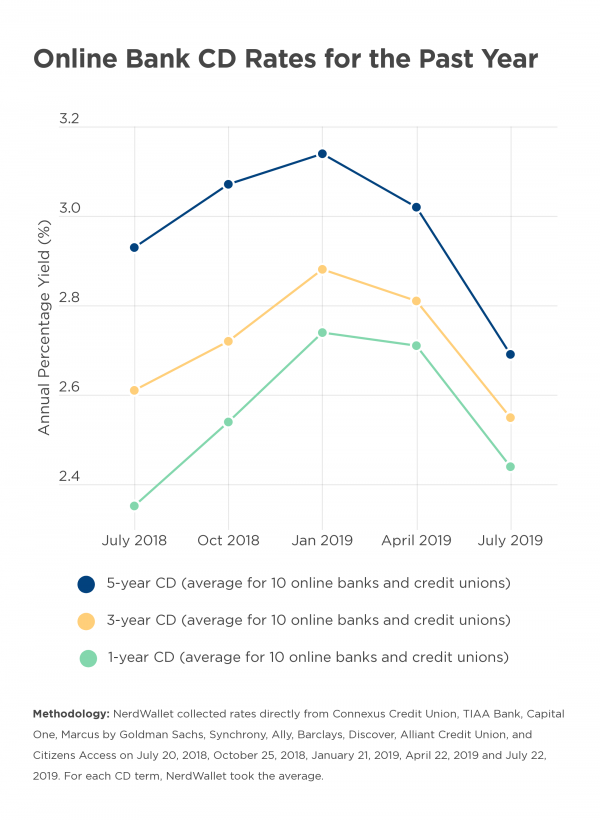- Personal Certificate of Deposit (CDs) Traditional and FLEX CDs. When you commit to keeping your funds with Union Bank for a defined period of time, we reward you with our highest interest rates. A Bank Certificate of Deposit (or CD) is an interest-earning vehicle.
- Here are the Best CD Interest Rates for February 2021 5 year: Navy Federal Credit Union, APY: 1.01%, $1,000 Min. Deposit 5 year: Suncoast Credit Union, APY: 0.95%, $500 Min. Deposit 5 year: Space.
- Earn 0.50% APY. with our 16-month CD on balances $1,000 to $24,999.99. Check out our other promotional CDs below and our full listing at the bottom of the page to select the rates and terms that suit you best. Call 800.297.2837 0.35% APY. on a 9 month CD for balances over $25,000.
- Simply Free Plus checking. $1000 minimum to open (when activity requirements met). Balance: Interest Rate: APY. $0.01 to $100,000: 0.70%: 0.70%: Over $100,000.
Certificates of Deposit - Branch Banks 2021. A certificate of deposit (CD) is a savings product offered by a bank in which a depositor (someone who has money to put into the bank) agrees to commit a certain amount of money for a set period of time, in return for a fixed rate of interest.
- Many term options of less than one year long
- Low interest rates on most term options
- Customers who can afford to make a deposit of at least $10,000
Union Bank is a big, international name in finance. However, its certificate of deposit (CD) rates are not necessarily the most competitive. Some of the best CD rates on the market offer much higher rates.
The bank does have some advantages. You can open most Union Bank CDs for just $350, which is lower than the minimums many other banks offer. Your interest then compounds daily and you have great flexibility with where and how you receive your interest payments. Keep reading for more of the pros and cons that come with opening a Union Bank CD account.
| CD Length | APY: Minimum Deposit $2,500 - $9,999 | APY: Minimum Deposit $10,000 - $24,999 | APY: Minimum Deposit $25,000 - $49,999 | APY: Minimum Deposit $50,000 - $99,999 | |
| 7-31 Day | 0.05% | 0.05% | 0.05% | 0.05% | Compare |
| CD Length | APY: Minimum Deposit $350 - $999 | APY: Minimum Deposit $1,000 - $9,999 | APY: Minimum Deposit $10,000 - $24,999 | APY: Minimum Deposit $25,000 - $49,999 | APY: Minimum Deposit $50,000 - $99,999 | |
| 32-179 Day | 0.05% | 0.05% | 0.05% | 0.05% | 0.05% | Compare |
| 180-364 Day | 0.10% | 0.10% | 0.10% | 0.10% | 0.10% | Compare |
| 12-17 Month | 0.15% | 0.15% | 0.15% | 0.15% | 0.15% | Compare |
| 18-23 Month | 0.15% | 0.15% | 0.15% | 0.15% | 0.15% | Compare |
| 24-35 Month | 0.20% | 0.20% | 0.20% | 0.20% | 0.20% | Compare |
| 36-47 Month | 0.20% | 0.20% | 0.20% | 0.20% | 0.20% | Compare |
| 48-59 Month | 0.20% | 0.20% | 0.20% | 0.20% | 0.20% | Compare |
| 60 Month | 0.20% | 0.20% | 0.20% | 0.20% | 0.20% | Compare |
18-Month CD Interest Rate Comparison

Overview of Union Bank CDs
Union Bank is one of the three brands in the Americas for the Mitsubishi UFJ Financial Group, Inc., or MUFG. MUFG is one of the world’s leading financial groups and offers a wide range of financial products. You can learn more about its other services through our banking review of Union Bank and MUFG.
When it comes to CDs, Union Bank has terms ranging from one week to five years in length. Term lengths between seven and 31 days require a minimum deposit of $2,500. All CDs longer than 31 days have a minimum deposit of just $350. All of these CDs are also available to use in an individual retirement account (IRA) with the same minimum deposits. Additional CD terms may be available for use then exclusively in IRAs.
CD interest compounds daily. CDs with a term length of 7 to 31 days pays out interest only at the maturity of the CD. If the term length is 32 days to one year, you can choose the frequency that interest is paid to you. You can elect to receive payments monthly, quarterly, semiannual, or annually, or you can choose to receive your money just on the maturity date. For terms greater than one year, you must take interest payments at least annually.
When you receive an interest payment, you have a few choices in how Union Bank credits it to you. The standard option is to keep your earnings in the CD account. This will help you to maximize interest earnings from your CD. You can also choose to have interest credited to a checking, savings or money market account (MMA) that you have with Union Bank. The final option is to receive your interest payment as a check.

Even though you can transfer interest payments to another account, you cannot withdraw any of the principal from your account without incurring an early withdrawal penalty. The penalty amount will depend on the length of your CD term.
For a CD term between 7 and 31 days, the penalty will be the greater of
- The interest you have earned on the amount you withdraw
- 7 days’ simple interest on the amount you withdraw
- The amount of interest you could have earned on the withdrawal amount over one half of the term
The penalty for terms between 92 days and one year will be the greater of

- 91 days’ simple interest on the amount you withdraw
- The compensating penalty (described below)
If you have a CD term of more than one year, the early withdrawal penalty is the greater of
- 181 days’ simple interest on the amount you withdraw
- The compensating penalty
Early withdrawals on a CD with a term greater than 92 days could cause you to pay what Union Bank calls the compensating penalty. This requires a bit of calculation. To determine the compensating amount, the bank will subtract the interest rate for your original CD from the current available interest rate on a CD term equal to the remaining time on your CD. This difference is then multiplied by the amount of the withdrawal, for the remaining term length, to determine the penalty amount.
Let’s say you open a 12-month CD with $1,000 at a rate of 2%. After six months you withdraw the $1,000. The remaining CD term is six months and let’s say the current available rate for a six-month CD is 1%. To determine the compensating penalty, Bank Union will subtract 1% (the rate for the remaining CD term) from 2% (the rate of the original CD term). The difference, 1%, is then multiplied by $1,000 (the amount you withdraw) for six months (time remaining on term). That would result in a compensating penalty of $5.
To withdraw your principal without paying a penalty, you will need to wait until your CD has reached maturity. At the end of your term, you will have either a three-day grace period, for CD terms of 31 days or less, or a 10-day grace period, for terms of 32 days or more. During that grace period you can make changes to your account, add money or withdraw from your account.
If you do not remove funds from your account by the end of the grace period, Union Bank will renew for another CD of the same term length as the original. The interest rate on the new CD will depend on the current available rates.
How Much You Earn With Union Bank CDs Over Time
Union Bank does not have particularly high interest rates. The result is that you won’t earn much in interest over your CD term. The table below shows what your approximate total balance will be depending on your initial deposit and your term length.
| Initial Deposit | 6-Month CD | 12-Month CD | 36-Month CD | 60-Month CD |
| $500 | $500.25 | $500.75 | $503.01 | $505.02 |
| $1,000 | $1,000.50 | $1,001.50 | $1,006.01 | $1,010.04 |
| $2,500 | $2,501.25 | $2,503.75 | $2,515.03 | $2,525.10 |
| $5,000 | $5,002.50 | $5,007.50 | $5,030.06 | $5,050.20 |
| $10,000 | $10,005 | $10,015 | $10,060.12 | $10,100.40 |
How Union Bank CD Rates Compare to Other Banks
Unless you open a CD with at least $10,000, you will get a low interest rate from Union Bank. So make sure that you compare CD rates from multiple banks to find the highest interest rates.
If you’re looking for a shorter-term CD, consider a bank like Ally. Ally is an online bank so you won’t be able to visit a branch in person if you have questions, but the interest rates on CDs of a few years or less are highly competitive. The shortest CD from Ally is three months but is no minimum deposit for opening an account.
One bank to consider if you’re looking for a CD term of a few years or more is Capital One. The long-term options from Capital One are competitive and there is no minimum for opening an account.
If you are primarily looking for retirement CDs or other long-term CDs, consider working with a broker. Edward Jones offers some of the highest interest rates and has terms ranging from three months up to 10 years. The minimum deposit for an account is $1,000. CDs operate slightly differently with a broker than with a traditional bank but for some customers, the differences amount to more flexibility.
| CD Account | Union Bank | Capital One | Ally Bank |
| 1 Year | 0.15% | 0.20% | 0.60% |
| 3 Year | 0.20% | 0.30% | 0.65% |
| 5 Year | 0.20% | 0.40% | 0.85% |
Compare Union Bank to Other Competitive Offers
Should You Get a Union Bank CD Account?
The CD rates from Union Bank are not competitive. The only exception is that some CD terms offer an interest rate of 0.20% if you make an initial deposit of $10,000 or more. If you can afford that initial deposit, Union Bank is worth considering. Otherwise, you should consider another bank.
Some banks may offer a great short-term rate but a lackluster long-term rate or vice versa. Make sure you choose an account based on your individual goals. If you aren’t sure exactly how you can use a CD to maximize your earnings, consider talking to a financial advisor. An advisor can walk you through different CD options. He or she could also help you to create a comprehensive financial plan that covers all of your savings goals and how you can meet them.
Making your money work as hard as possible is important. Our Certificates of Deposit offer superior interest rates, have many convenient features and options, and are available in a variety of terms.
Simple CDs
Earn a fixed rate of interest over the entire period of the investment. Starting minimum deposit of $500. Our Simple CDs offer our highest APY for the term of the CD but are not eligible for the potential year-end Member Saver Reward1.
| Term Length | Interest Rate2 | APY3 |
|---|---|---|
| 6 Months | 0.40% | 0.40% |
| 12 Months | 0.50% | 0.50% |
| 18 Months | 0.55% | 0.55% |
| 24 Months | 0.60% | 0.60% |
| 36 Months | 0.75% | 0.75% |
Standard CDs
Earn a fixed rate of interest over the entire period of the investment. Roulette no deposit bonus. Starting minimum deposit is $500. These CDs are eligible for our Member Saver Reward1.
| Term Length | Interest Rate2 | APY3 |
|---|---|---|
| 6 Months | 0.33% | 0.33% |
| 12 Months | 0.42% | 0.42% |
| 18 Months | 0.46% | 0.46% |
| 24 Months | 0.50% | 0.50% |
| 36 Months | 0.63% | 0.63% |

Bump Rate CDs
The bump rate feature lets you invest long-term with increased flexibility! If rates increase, CD owners have the option to bump the rate one time during the term. Starting minimum deposit is $500. These CDs are eligible for our Member Saver Reward1.
Union Bank Cd Rates Specials
| Term Length | Interest Rate2 | APY3 |
|---|---|---|
| 48 Months | 0.72% | 0.72% |
| 60 Months | 0.80% | 0.80% |
Youth CDs
Available to members if term maturity occurs before their 18th birthday, additional deposits of $50 or more are allowed throughout the CD term. Starting minimum deposit of $500 and maximum total deposits of $10,000. These CDs are eligible for our Member Saver Reward1.
| Term Length | Interest Rate2 | APY3 |
|---|---|---|
| 6 Months | 0.58% | 0.58% |
| 12 Months | 0.71% | 0.71% |
HSA CDs
Designed specifically for individuals who have a health savings plan. Starting minimum deposit is $500. These CDs are eligible for our Member Saver Reward1.
| Term Length | Interest Rate2 | APY3 |
|---|---|---|
| 12 Months | 0.42% | 0.42% |
| 24 Months | 0.50% | 0.50% |
| 36 Months | 0.63% | 0.63% |
| 48 Months | 0.72% | 0.72% |
An HSA CD can be opened by calling us or stopping by.
Union Bank 12 Month Cd

Union Bank Cd Rates Certificate Of Deposit
While the Member Saver Reward occurs with great regularity, this credit union benefit is not guaranteed. ↩︎↩︎2↩︎3↩︎4↩︎5
Rates are subject to change on a daily basis. ↩︎↩︎2↩︎3↩︎4↩︎5
APY assumes interest payouts remain in your certificate account until maturity. Interest rate is guaranteed for the length of the term. An early withdrawal penalty may be applied when a withdrawal is made prior to maturity of the certificate and could result in loss of principal. ↩︎↩︎2↩︎3↩︎4↩︎5